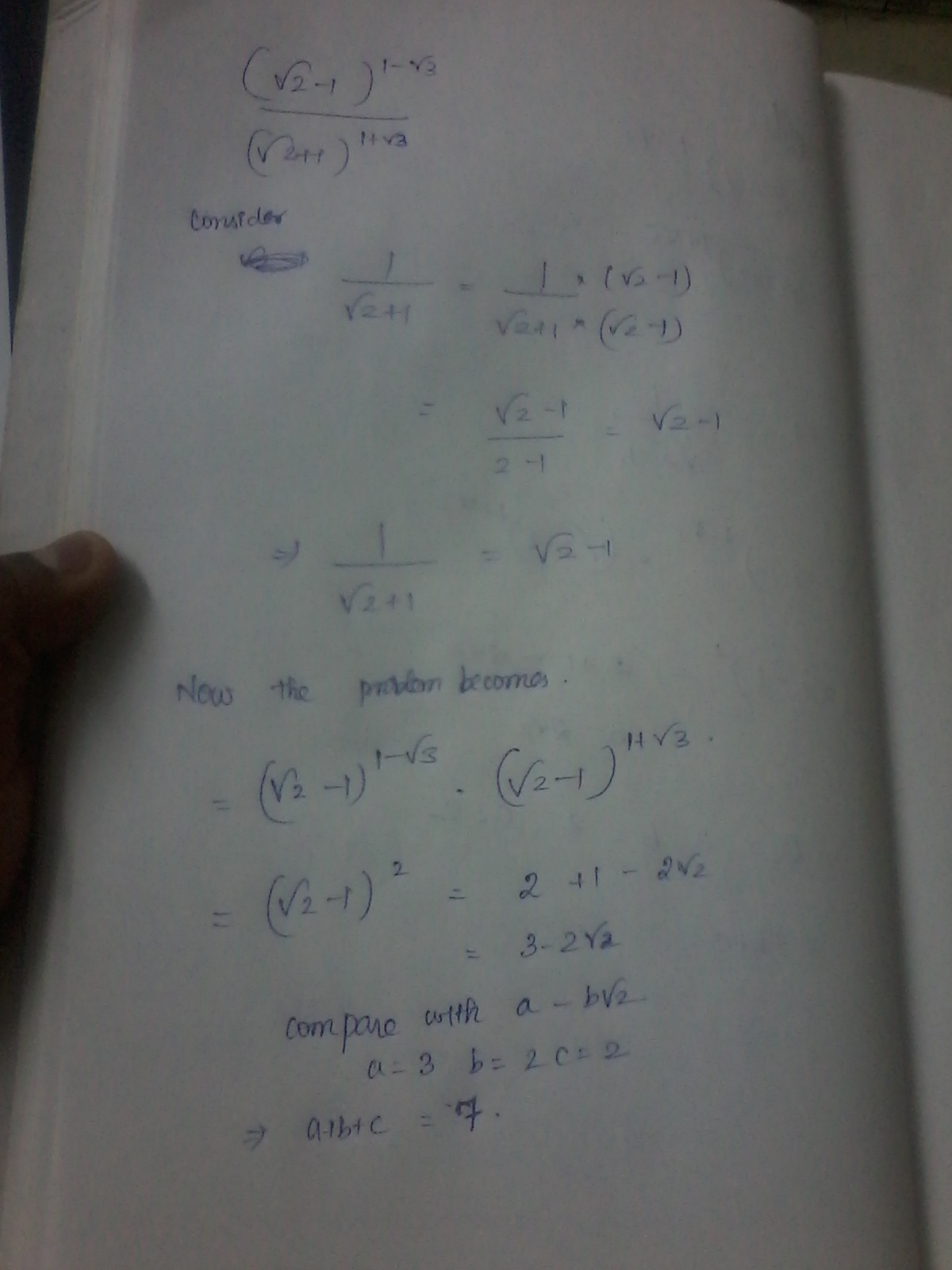Step-up Rationalization
 (
2
+
1
)
1
+
3
(
2
−
1
)
1
−
3
(
2
+
1
)
1
+
3
(
2
−
1
)
1
−
3
If the expression above can be simplified to the form of a − b c , where a , b , and c are positive integers with c square-free.
What is the value of a + b + c ?
Image Credit: Wikimedia Trigonometry Triangle by Limaner
The answer is 7.
This section requires Javascript.
You are seeing this because something didn't load right. We suggest you, (a) try
refreshing the page, (b) enabling javascript if it is disabled on your browser and,
finally, (c)
loading the
non-javascript version of this page
. We're sorry about the hassle.
4 solutions
Great problem by the way :)
Log in to reply
thank you very much
nice problem
The expression is of the following form.
( a + b ) c + d ( a − b ) c − d
We can rewrite the expression above as follows.
( a + b ) c ( a + b ) d ( a − b ) c ( a − b ) − d = ( a + b ) c ( a − b ) c × ( a − b ) d ( a + b ) d 1
=
( a + b ) c ( a − b ) c × ( a 2 − b 2 ) d 1 = [ a + b a − b ] c × [ a 2 − b 2 1 ] d
Now substituting a = 2 , b = c = 1 , and d = 3 we see that the above expression is
[\frac{\sqrt{2} - 1}{\sqrt{2} + 1}]^1 \times [\frac{1}{\sqrt{2}^2 - 1^2}]^\sqrt{3} = \frac{\sqrt{2} - 1}{\sqrt{2} + 1} \times [\frac{1}{2 - 1}]^\sqrt{3}
=
\frac{\sqrt{2} - 1}{\sqrt{2} + 1} \times 1^\sqrt{3} = \frac{\sqrt{2} - 1}{\sqrt{2} + 1}
Rationalizing the denominator gives us that the above expression is equal to
( 2 − 1 ) 2 = 3 − 2 2
Finally we see that 3 + 2 + 2 = 7!
Curtis's solution is much more slick. lol.
Thanks for the help.
That's really smart, replacing the irrationals with variables and not even having to solve till the very end. I'll have to make a note of that. Thanks!
This an easy problem. My solution wasn't as simple as Curtis Clement's, but it gets the job done. :)
The top part, (sqrt2-1)^(1-sqrt3) can easily be reincorporated into the denominator. Since 1-sqrt3 is a negative in the numerator, we can apply it in to the denominator with the exponent being sqrt3-1.
We get this: 1 -OVER- (sqrt2 - 1)^(sqrt3 - 1) * (sqrt2+1)^(1+sqrt3)
We try to rationalize the exponent in the (sqrt2 - 1)^(sqrt3 - 1) part by raising this whole fraction to the power of sqrt3 + 1 (or 1+sqrt3, hang on, this is going to be important).
We get this: 1 -OVER- (sqrt2-1)^(2) * (sqrt2+1)^(4+2sqrt3)
(The exponent two came from difference of squares [1-sqrt3] * [1+sqrt3] and the 4+2sqrt3 exponent came from (a+b)(a+b) = a^2 +2ab+ b^2)
We draw out from the (sqrt2+1)^(4+2sqrt3) part and separate into
(sqrt2+1)^(2) * (sqrt2+1)^(2+2sqrt3) (exponential rules)
Again, from here, we can use difference of squares since
(sqrt2-1)^(2) and (sqrt2+1)^(2) can be reorganized as [(sqrt2-1)(sqrt2+1)]^2
AKA 1.
We get this: 1 -OVER- 1 * (sqrt2+1)^(2+2sqrt3)
Now from here, we can again separate (sqrt2+1)^(2+2sqrt3) into
[(sqrt2+1)^(2)] ^ (1+sqrt3)
Since we have originally raised the original fraction to (1+sqrt3)th power, it makes sense to take the (1+sqrt3)th root to get the original fraction back.
1 to any root or power is 1, and taking the (1 + sqrt3)th root of the denominator results in just (sqrt2+1)^2
Rationalizing the root from there, we get (sqrt2-1)^2
Which is equal to 3-2sqrt2
In the form of a-bsqrtc, a+b+c = 3+2+2 = 7.
And we are done.

Using ( 2 − 1 ) ( 2 + 1 ) = 1 a n d a b × a c = a b + c :
( 2 + 1 ) 1 + 3 ( 2 − 1 ) 1 − 3 × ( 2 + 1 ) 1 − 3 ( 2 + 1 ) 1 − 3 = ( 2 + 1 ) 2 1 ( 2 + 1 ) 2 1 × ( 2 − 1 ) 2 ( 2 − 1 ) 2 = ( 2 − 1 ) 2 = 3 − 2 2 ∴ a + b + c = 3 + 2 + 2 = 7